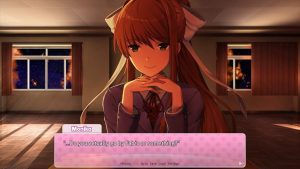I was playing the Hex the other day, and the subtle 4th wall breakings were absolutely on point. How file manipulation and direct addresses sometimes gave me spine-chilling was a scary experience. No doubt Daniel Mullins is a genius in this regard. I was thinking how when we dive into a video game, we’re only looking to escape reality, not to be reminded of it.
Key Takeaways
- 4th wall breaks in games create an unsettling experience by blurring reality and making the game feel personal and engaging.
- This technique introduces unpredictability by breaking the usual flow and adding tension by challenging conventional strategies.
- Psychological horror games like Doki Doki Literature Club use 4th wall breaks to stimulate fear by making players feel watched and manipulated.
- The emotional impact of breaking the 4th wall is significant as characters addressing players directly can be both scary and invasive, which can leave a lasting impression on the players.
I believe it is one reason why characters breaking the 4th wall is so terrifying—and sometimes downright creepy. It can be a thrilling twist, but it can also disturb players to their core. In most cases, it happens when characters become aware of the player’s existence or directly address the audience.
But what does this term actually mean, and why does it have such a powerful impact on players? I will talk about this fascinating concept with a closer look:
What Does It Mean?
Originating from the theatre, the 4th wall refers to the imaginary wall that separates the performers from the audience. Breaking the 4th wall means when characters in a play, movie, or video game turn their attention to the audience or players, acknowledging their presence either by addressing them or by any subtle means.

This happens in various forms in video games, from dialogues to file manipulation. For example, I’m sure most of you have played or at least know Doki Doki Literature Club, especially since it rules Steam with a 10/10 rating. Monika breaks the 4th wall by reading your data from the game files and addressing you directly. It is truly an unsettling experience, for me at least.
But what makes it a fascinating concept? I can only think of the following reasons:
Creating Unpredictability By Blurring Reality
One reason 4th wall breaks are so effective in giving a chilling experience to the players is that they introduce an element of unpredictability. You can feel the usual flow of the game-breaking when game characters address you by looking directly into your eyes.
This unpredictability is not only thrilling, but it also adds a layer of tension. How so? Well, you won’t be able to use your conventional strategies to win the game.
The most powerful perspective about this concept is how it blurs the line between the game world and reality. I agree that this can make the experience more engaging.
However, it also raises questions about the nature of reality itself. Doesn’t it challenge your perception of the games as only a way to escape reality when characters in a game become aware of their existence and yours?
By the way, whoever thought of accessing the previous game files to know about the player and incorporated it as a part of breaking the 4th wall is a genius.
The Emotional Impact On Players
When a video game character suddenly talks to you or acknowledges your presence, it can really mess with your head—in a good way and sometimes in a creepy way. This kind of 4th wall break can make the game feel way more personal. It’s like the game knows you’re there, making the whole experience more engaging and unforgettable.
But there’s a flip side. These moments can also be pretty unsettling. They pull you out of the game world and remind you that you’re just sitting in front of a screen.
This can feel intrusive and weird, almost like the game is breaking the rules and peeking into your real life. It’s a mix of excitement and discomfort that sticks with you long after you’ve turned off the console.

Undertale is a good example of leaving a long-lasting emotional impact on players. The character Flowey breaks the 4th wall by commenting on your behavior, creating a deeply personal and sometimes disturbing connection. Fans still believe the game would be worth nothing without the various 4th wall breakings.
The Role Of Psychological Horror
4th wall breaks are especially effective in psychological horror games. They play on the fear of being watched and manipulated, all the common themes in horror. When a game character looks at you directly, it can feel like an invasion of privacy, which increases the sense of fear. The unpredictability of these interactions keeps players on edge, and they are never quite sure what to expect next.
Once again, the Doki Doki Literature Club is a good example to verify my point. How the disturbing messages and images create a sense of paranoia and how Monika reads the game files to connect with you on a personal level messes up badly with your psychological health. Nevertheless, it is a scary yet thrilling experience.
Good job! Please give your positive feedback 😏
How could we improve this post? Please Help us. 💡
I have been into gaming since my childhood and have been writing about it for three years now. Pursuing a bachelor’s degree in Communication Studies side-by-side, I spend lots of time reading books, learning new skills, playing chess, working out, and engaging in Reddit threads related to gaming.



